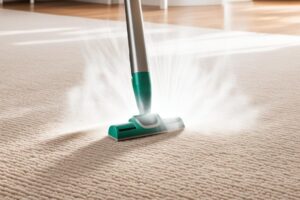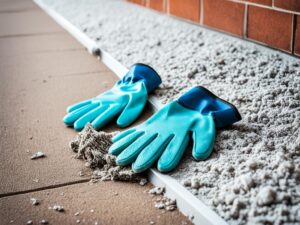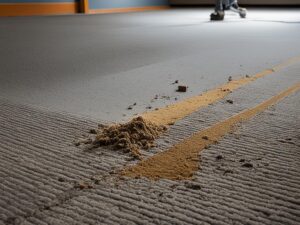When it comes to choosing between carpet and hardwood floors, many homeowners and experts debate which option is healthier. In this article, we will thoroughly compare the benefits of carpet and hardwood floors for indoor environments, examining factors such as cleanliness, allergens, insulation, comfort, and maintenance. By understanding the health advantages of each flooring type, you can make an informed decision about which option is best for you and your home.
Key Takeaways:
- Understanding the health advantages of carpet and hardwood floors will help you make an informed decision.
- Carpet can act as a storage for allergens, while hardwood floors are easier to clean and maintain.
- Proper cleaning and maintenance are crucial for both carpet and hardwood floors to minimize health risks.
- Consider other factors such as moisture, insulation, comfort, and indoor air quality when choosing flooring.
- Eco-friendly options are available for both carpet and hardwood floors, so consider sustainability as well.
How Flooring Affects Your Health
Your choice of flooring can have a significant impact on your health. Hardwood floors are often perceived as being healthier than carpet because they are easier to clean and do not allow mold and dust to accumulate. However, carpet can act as a storage for allergens, leading to worsening of asthma symptoms and allergies. Both types of flooring can be problematic if not properly cleaned and maintained. It is important to consider the potential impact on allergies and asthma when choosing between carpet and hardwood floors.
When it comes to allergies and asthma, the type of flooring you have in your home can make a difference. Carpet, with its soft fibers and ability to trap dust and allergens, can be a breeding ground for triggers that worsen asthma symptoms and allergies. On the other hand, hardwood floors are easier to clean and do not provide a conducive environment for allergens to thrive. Regular vacuuming and deep cleaning can help keep allergens at bay.
Carpets can also contribute to poor indoor air quality. The fibers can trap pollutants and contaminants, which can be released into the air when disturbed. This can be especially problematic for individuals with respiratory conditions such as asthma. Hardwood floors, on the other hand, do not trap allergens and contaminants as easily, leading to better indoor air quality.
Proper cleaning and maintenance are key for both carpet and hardwood floors. Regular vacuuming, steam cleaning for carpets, and sweeping for hardwood floors can help remove allergens and keep your indoor environment healthier. It is important to follow manufacturer’s recommendations for cleaning products and methods to avoid damaging the flooring or causing health issues.
“The type of flooring you choose can have a significant impact on your health. While hardwood floors are often seen as the healthier option, carpet can also be a comfortable and suitable choice when properly maintained and cleaned”, says Dr. Emily Jones, a renowned allergist.
In addition to allergies and asthma, other factors such as moisture, insulation, and comfort should be considered when comparing carpet and hardwood floors. Carpets tend to absorb more moisture, which can lead to mold and mildew growth if not properly dried. On the other hand, the softness and warmth of carpets can provide greater comfort underfoot, especially during cold winters. Hardwood floors offer better insulation and are more suitable for areas prone to moisture, such as bathrooms.
To make an informed decision about the right flooring for your health, it is essential to consider your specific needs, lifestyle, and any existing health conditions. Consulting with a flooring professional or allergist can provide valuable insights and guidance tailored to your circumstances.
| Factors | Carpet | Hardwood Floors |
|---|---|---|
| Allergens Trapped | Yes | No |
| Indoor Air Quality | Can be lower | Usually better |
| Cleaning Effort | More effort | Less effort |
| Moisture Resistance | Less resistant | More resistant |
| Comfort | Softer and warmer | Firmer |
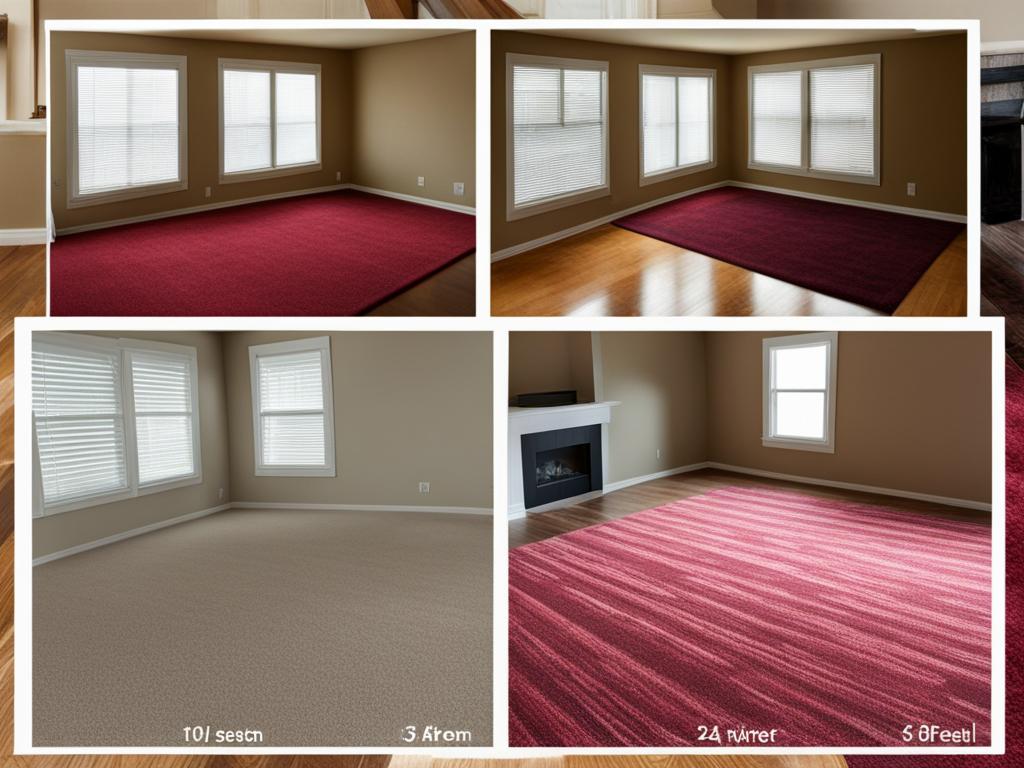
Allergies and Asthma: Comparing Carpet and Hardwood Floors
Reducing exposure to triggers is crucial for preventing asthma or allergy flare-ups. When it comes to choosing between carpet and hardwood floors, individuals with allergies or asthma need to consider the potential impact on their respiratory health. Let’s compare the two options.
Carpet and Asthma Symptoms
Studies have shown that carpets can act as a haven for allergens, such as dust mites, pet dander, and pollen. These allergens can be easily released into the air when carpets are disturbed, leading to asthma symptoms like wheezing, coughing, and shortness of breath. For individuals with asthma, carpet flooring may exacerbate their condition and trigger more frequent attacks.
Hardwood Floors and Allergies
In contrast, hardwood floors are easier to clean and maintain, making them a better option for individuals with allergies. The smooth surface of hardwood does not allow allergens to accumulate as easily as they do on carpet. Regular cleaning of hardwood floors can help minimize the presence of allergens and improve indoor air quality.
Carpet Cleaning for Allergies
For those who prefer the warmth and comfort of carpet, regular and thorough cleaning is essential to reduce allergens. Vacuuming with a high-efficiency particulate air (HEPA) filter can effectively remove dust mites, pollen, and pet dander from the carpet fibers. Steam cleaning, when done regularly, can also help eliminate allergens that have settled deep into the carpet. By taking these measures, carpet flooring can be made safer for individuals with allergies or asthma.
Cleaning Hardwood Floors for Allergies
While hardwood floors may be less prone to allergen accumulation, regular cleaning is still necessary to maintain a healthy indoor environment. Sweeping or dry mopping can remove dust and debris, while damp mopping with a hardwood-safe cleaner can help eliminate any remaining allergens. Avoid using products that contain harsh chemicals or volatile organic compounds (VOCs), as these can worsen asthma symptoms.
Evaluating the Material
It’s important to keep in mind that both carpet and hardwood floors can have varying degrees of impact on allergies and asthma depending on the materials used. Synthetic carpets, for example, may release VOCs that can exacerbate respiratory symptoms. When selecting carpet or hardwood flooring, consider using natural or low-VOC materials to minimize the potential health risks.
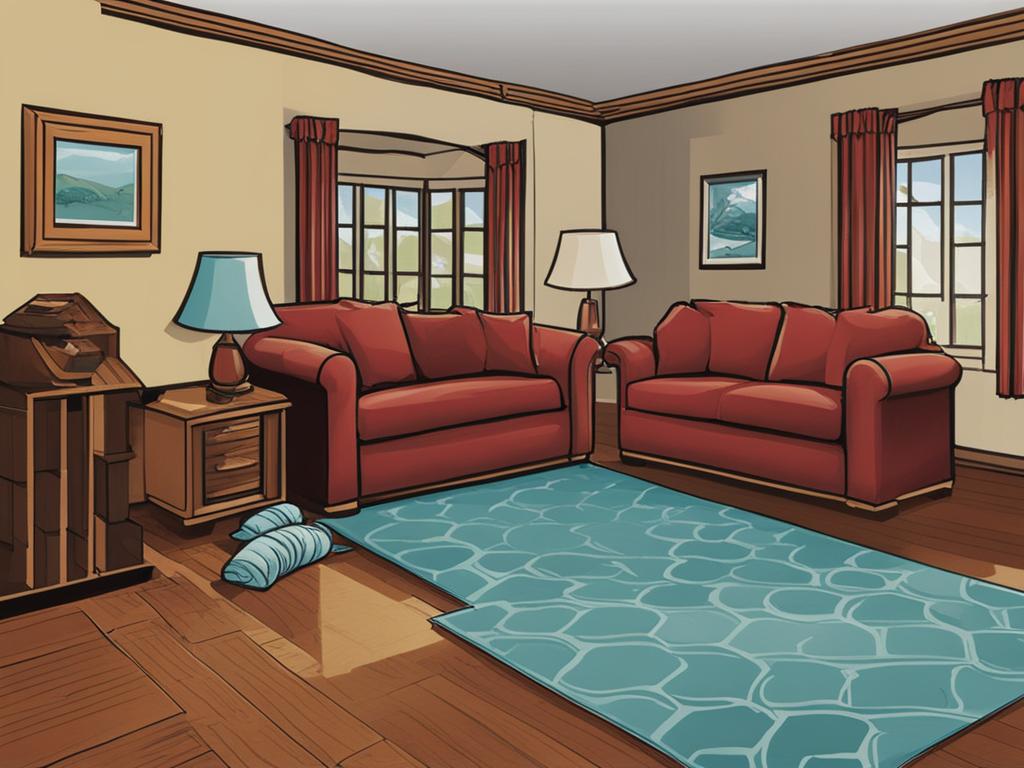
By considering the specific needs and sensitivities of individuals with allergies or asthma, it is possible to choose flooring options that promote a healthier living environment.
Additional Considerations: Moisture, Insulation, and Comfort
When comparing carpet and hardwood floors, it’s important to consider factors beyond allergies and asthma. One key difference is their response to moisture. Carpets tend to absorb more moisture than hardwood floors, making them less suitable for wet areas like bathrooms. On the other hand, hardwood floors provide better resistance to moisture, making them a practical choice for high-moisture environments.
Another factor to consider is insulation. Carpet’s insulating properties help to trap air within its fibers, providing better insulation for your home. This can keep your home warmer, reduce heating costs, and create a cozy atmosphere during cold winters. Hardwood floors, while not as effective at insulation, offer other benefits such as easy cleaning and a sleek, timeless aesthetic.
Comfort is a subjective factor that can significantly impact your daily experience at home. Many people find the soft fabric of carpets to be more comfortable underfoot compared to the hardness of hardwood floors. The cushioned feel of carpets offers a cozy and comforting sensation, especially during colder seasons. However, some individuals may prefer the luxurious look and feel of hardwood floors, even if they are not as soft underfoot.

Choosing between carpet and hardwood floors involves considering moisture, insulation, and comfort. While carpet absorbs more moisture, making it unsuitable for wet areas, it offers better insulation, which can keep your home warm and reduce utility bills. Hardwood floors, on the other hand, are more resistant to moisture and require less maintenance. Ultimately, the decision comes down to personal preference and your specific needs.
Ease of Cleaning and Maintenance
When it comes to keeping your floors clean and well-maintained, both carpet and hardwood have their own unique considerations. Let’s take a close look at the cleaning and maintenance requirements for each:
Carpet Cleaning and Maintenance
Carpet cleaning involves more effort and time compared to hardwood floors. Regular vacuuming is necessary to remove dirt, dust, and debris that can accumulate deep within carpet fibers. For thorough cleaning, professional carpet cleaners or specialized carpet cleaning machines are often required.
“Carpet cleaning can be more time-consuming and may require professional assistance.”
To ensure the longevity of your carpet, it requires regular deep cleaning. This involves hot water extraction or steam cleaning, which can effectively remove embedded dirt and stains. Additionally, carpet owners should consider investing in treatments to protect against stains, such as Scotchgard.
“Regular deep cleaning is crucial for maintaining the appearance and condition of your carpet.”
Hardwood Floor Cleaning and Maintenance
Compared to carpet, hardwood floors are generally easier and faster to clean. Regular sweeping or vacuuming with a soft-bristle attachment helps remove dirt and debris from the surface. For occasional deep cleaning, using a specialized wood floor cleaner is recommended.
“Hardwood floors are low-maintenance and can be cleaned with simple sweeping or vacuuming.”
One potential downside of hardwood floors is their vulnerability to scratches and dents. To prevent damage, it’s important to place protective felt pads on the legs of furniture and avoid dragging heavy objects across the floor. Additionally, hardwood floors may require occasional refinishing to maintain their appearance.
“Protecting hardwood floors from scratches and refinishing when necessary can help prolong their lifespan.”
Upscale hardwood floors might benefit from professional cleaning and maintenance services such as waxing or polishing to restore their shine and minimize signs of wear and tear.
Cost of Maintaining Hardwood Floors
While hardwood floors are easier to clean, they tend to require more maintenance than carpet, both in terms of time and cost. Hardwood floors may need to be refinished every 3-5 years, which can be expensive. Additionally, scratches or damage to hardwood floors may require professional repair services.
“Maintenance costs for hardwood floors can be higher, including the need for refinishing and occasional repairs.”
On the other hand, carpet typically needs to be replaced every 5-10 years, depending on the wear and tear it receives. Carpet replacement costs can add up over time, but they are often more affordable than refinishing hardwood floors.
Regular Cleaning for Carpets and Hardwood Floors
Regular cleaning is essential for both carpets and hardwood floors to maintain their appearance and prolong their lifespan. Here are some tips for keeping both types of flooring clean:
- Vacuum carpets at least once a week, focusing on high-traffic areas.
- Consider using a carpet cleaner or steam cleaner every 6-12 months.
- Wipe up spills on hardwood floors immediately to prevent staining and damage.
- Sweep or vacuum hardwood floors regularly to remove dirt and debris.
- Use a specialized wood floor cleaner for occasional deep cleaning.
By following these regular cleaning practices, you can maintain the cleanliness and condition of your carpets and hardwood floors.
| Aspect | Carpet | Hardwood Floors |
|---|---|---|
| Cleaning Effort | High | Low |
| Maintenance Cost | Low (replacing every 5-10 years) | High (refinishing every 3-5 years) |
| Longevity | Short-term (5-10 years) | Long-term (decades) |
| Maintenance | Regular vacuuming, occasional deep cleaning | Sweeping, occasional wood floor cleaner |
Table: A comparison of cleaning and maintenance aspects between carpet and hardwood floors.
Ultimately, the decision between carpet and hardwood floors should consider your lifestyle, preferences, and budget. While carpet requires more effort to clean, it offers warmth and comfort. Hardwood floors are easier to clean but require more maintenance and upfront investment.
Having explored the cleaning and maintenance aspects of both carpet and hardwood floors, let’s now turn our attention to soundproofing and indoor air quality.
Soundproofing and Indoor Air Quality
When it comes to soundproofing and indoor air quality, carpet flooring offers distinct advantages over hardwood floors. For individuals who are sensitive to noise or have difficulty sleeping, the soundproofing qualities of carpet can provide a quieter and more peaceful indoor environment. The soft fibers of carpet absorb and dampen sound, creating a more sound-insulated space compared to the harder surface of hardwood floors.
In addition to soundproofing, carpet also plays a crucial role in improving indoor air quality. The fibers of carpet act as a natural filter, trapping and holding contaminants such as dust, pollen, and other allergens that can affect air quality. This can be especially beneficial for individuals with allergies or respiratory conditions, as the carpet helps to reduce the concentration of airborne particles.
“Carpet acts as a filter, trapping and holding contaminants that can affect indoor air quality.”
On the other hand, with hardwood floors, there is no filtering mechanism. Without the ability to trap particles, allergens and contaminants can become airborne more easily, potentially leading to poor indoor air quality. Regular and thorough cleaning of hardwood floors becomes essential to maintain a healthy environment.
The Benefits of Carpet for Noise Reduction:
- Soft fibers absorb and dampen sound, creating a quieter indoor environment.
- Reduces noise transmission between floors in multi-level buildings.
- Helps control echoes and reverberation in open spaces.
The Impact of Carpet on Indoor Air Quality:
- Traps and holds dust, pollen, and other allergens, improving air quality.
- Reduces the concentration of airborne particles, benefiting individuals with allergies or respiratory conditions.
- Requires regular cleaning and maintenance to prevent the buildup of allergens and contaminants.
When considering the impact of flooring on soundproofing and indoor air quality, carpet provides notable advantages over hardwood floors. The ability to reduce noise and filter contaminants makes carpet flooring a favorable choice for individuals seeking a quieter and healthier living environment.
Ecological Considerations: Carpet vs. Hardwood Floors
Besides health considerations, it is important to think about the ecological impact of flooring choices. Both carpet and hardwood floors have their own sustainability challenges and environmental implications.
When it comes to hardwood floors, the production process typically involves cutting down trees, which can deplete forests and harm ecosystems. This raises concerns about deforestation and the loss of biodiversity.
On the other hand, carpets can be made from various materials, including synthetic fibers and recycled materials. The advantage of carpets lies in their potential for recycling. Old carpets can be transformed into plastic bottles or new carpeting, reducing waste and promoting a closed-loop system.
By considering the long-term sustainability and environmental impact of your flooring choice, you can contribute to a greener lifestyle and support eco-friendly practices in the industry.
While both carpet and hardwood floors have their ecological implications, it’s essential to evaluate the overall lifecycle impact and choose the option that aligns with your values and minimizes your carbon footprint.
| Environmental Impact | Sustainability | |
|---|---|---|
| Carpet | May contain synthetic materials and chemicals; can act as a storage for allergens and require regular maintenance. | Potential for recycling; closed-loop system supports waste reduction. |
| Hardwood Floors | Involves cutting down trees; contributes to deforestation and loss of biodiversity. | Depends on the sourcing of wood; certification programs ensure responsible forestry practices. |
Conclusion
After thoroughly comparing the benefits of carpet and hardwood floors, it is evident that both options have their advantages when it comes to creating a healthy home environment. Ultimately, the choice between carpet and hardwood floors depends on your specific needs and preferences.
Carpets offer warmth, insulation, and comfort underfoot, making them ideal for areas where a cozy ambiance is desired. On the other hand, hardwood floors are easier to clean and maintain, which can be especially beneficial for individuals with allergies or asthma.
Regardless of your preferred flooring option, the key to maintaining a healthy indoor environment is regular cleaning and proper maintenance. This will help minimize the accumulation of allergens and contaminants, ensuring a cleaner and fresher living space.
When making your decision, it is important to consider various factors such as allergies, asthma, moisture, insulation, soundproofing, comfort, maintenance, and eco-friendliness. By evaluating these aspects, you can choose the flooring option that aligns with your priorities for a healthy and sustainable home.
FAQ
What are the benefits of carpet?
Carpet provides warmth, insulation, and comfort underfoot. It can also act as a filter, trapping and holding contaminants that can affect indoor air quality.
What are the benefits of hardwood floors?
Hardwood floors are easier to clean and maintain compared to carpets. They do not allow mold and dust to accumulate and can be a long-term investment for your home.
Are carpets or hardwood floors healthier for allergies and asthma?
Hardwood floors are generally considered healthier for allergies and asthma as they are easier to clean and do not trap allergens. However, regular steam cleaning can make carpet flooring safe for those with allergies or asthma.
How does flooring choice impact allergies and asthma?
Carpets can act as a storage for allergens, worsening asthma symptoms and allergies. Hardwood floors are easier to clean and keep free of dust and allergens, reducing triggers for asthma or allergy flare-ups.
Do carpets or hardwood floors absorb more moisture?
Carpets absorb more moisture than hardwood floors, making them unsuitable for wet areas such as bathrooms.
Which type of flooring provides better insulation?
Carpet flooring provides better insulation due to the trapping of air in the carpet fibers. This can help keep your home warmer and potentially reduce utility bills.
Which type of flooring is more comfortable?
Comfort is subjective, but many people find the soft fabric of carpets to be more comfortable underfoot, especially during cold winters.
Are hardwood floors easier to clean than carpets?
Yes, hardwood floors are generally easier and faster to clean compared to carpets. Carpets require special equipment and more time for proper cleaning.
How does carpet flooring affect soundproofing?
Carpet flooring provides better soundproofing properties compared to hardwood floors. This can be beneficial for individuals who are sensitive to noise or have difficulty sleeping.
How does carpet flooring impact indoor air quality?
The fibers of carpet act as a filter, trapping and holding contaminants that can affect indoor air quality. Hardwood floors, without a filtering mechanism, can allow allergens and contaminants to become airborne more easily.
What are the ecological considerations for carpet and hardwood floors?
Hardwood flooring requires the use of real trees, which can harm the environment. Carpets, on the other hand, can be recycled repeatedly into plastic bottles or new carpeting, making them a more sustainable choice.

